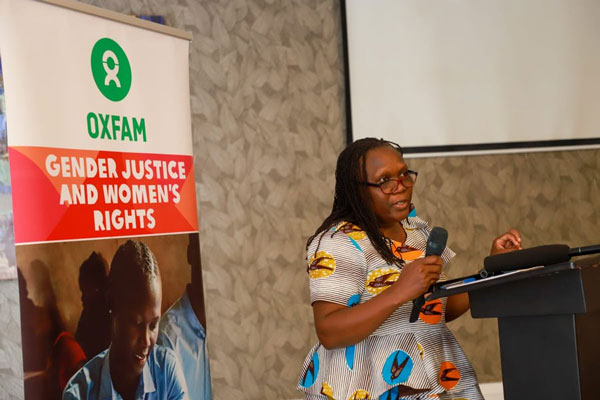
Kampala, Uganda | THE INDEPENDENT | Women activists want unpaid care work to be recognized as valuable work since it contributes to the social and economic development of societies.
The activists were speaking at a validation workshop at Mestil Hotel where academicians, activists, and government officials gathered to discuss research on the implementation of care policies in Uganda.
Peace Immaculate Chandini, the Women’s Rights Coordinator of Oxfam in Uganda said that there is little attention and value attached to unpaid care work in society. Unpaid care work includes domestic chores, and caring for the children, the sick, and the elderly without any financial or economic benefit.
Research indicates that globally, 78.4 percent of households are headed by women who are increasingly shouldering the financial and childcare responsibilities of a household without support from fathers. The majority of the care work worldwide is undertaken by unpaid careers, mostly women and girls from socially disadvantaged groups.
Chandini said that unpaid care work deprives caretakers of the opportunity to engage in other forms of productive work. She said that if care work is recognized as valuable work then society shall then discuss its redistribution such that not only women and girls shoulder the burden of the work.
Redistribution of the unpaid care work, she said would reduce the amount of time women spend on such work and hence create time to engage in other productive ventures.
Chandini said that policies in Uganda are still weak as far as promoting unpaid care work as paid work is concerned.
Oxfam and Uganda Women’s Network- UWONET Commissioned a study titled “The National Roll-out of the Care Policy Scorecard in Uganda 2022: A Contextualized Analysis of Uganda’s Investment and Policy Action on Care and Domestic Work”. The study, still ongoing is headed by Ass. Prof. Mary Sonko from Uganda Christian University.
Chandini however said preliminary results leave quite a lot to be desired in advocating for better policy formulation and implementation for recognition of unpaid care work as work.
Paulina Kiwangu, the UN Women’s Country Director in Uganda said that the world and the country specifically should have a discussion on paying for the currently unpaid care work. She said this can only be achieved when society appreciates the value of this work and the government introduces and implements favorable policies on care work.
Kiwangu said that the society and all beneficiaries of the different forms of care work should be able to pay for it. She further suggested a mindset change to address issues of societal expectations and gender roles and promote positive masculinity where masculinity doesn’t necessarily mean burdening some sections of society including women.
During the meeting, Rita Aciro, the Executive Director of UWONET proposed a better framing of the issue to make it a fundamental development and social issue that can be modeled into a proper social campaign.
She said often when the discussion of unpaid care arises, it is met with resistance from people who think the campaign is about women wanting to be paid for doing domestic work in their homes and taking care of their children.
According to Aciro, women’s engagement in paid care work takes away their opportunity to participate in other public discourse and public allocation of resources among others. She however emphasized that ultimately, the resultant negative outcomes do not only affect the caretakers who are mostly women but the society at large.
Dr. Peace Musiimenta, a lecturer of Gender studies at Makerere University said unpaid care work should not be viewed solely as a burden to the caretakers who are mostly women but as a deprivation of men whom society has told they cannot engage in some work at home.
“The men too are being affected. Imagine during COVID when a man wished to help with the kitchen but couldn’t be allowed to because society considers that as work for women” said Dr Musiimenta while calling for a reflection on the societal perspective of the concept of masculinity.
****
URN
 The Independent Uganda: You get the Truth we Pay the Price
The Independent Uganda: You get the Truth we Pay the Price



